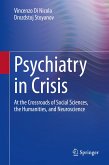Epidemiological research in psychiatry is a field of study in patients with psychiatric disorders that investigates causes in order to develop clinical applications of the results, and to create applications to health services plans for individuals and/or communities.
Written by a leading authority on social psychiatry and psychiatric epidemiology who has been residing in Nagasaki for most of his life, and also worked as a head of the WHO Collaborating Centre for Research and Training in Mental Health, it describes not only outstanding epidemiological studies and mental support reports for atomic bomb sufferers but also international collaborative projects on schizophrenia, affective disorders, and common mental disorders.
This book provides a valuable resource not only for physicians and researchers in the field of psychiatry and mental health but for all those who work in the field of mental health.
Dieser Download kann aus rechtlichen Gründen nur mit Rechnungsadresse in A, B, BG, CY, CZ, D, DK, EW, E, FIN, F, GR, HR, H, IRL, I, LT, L, LR, M, NL, PL, P, R, S, SLO, SK ausgeliefert werden.









